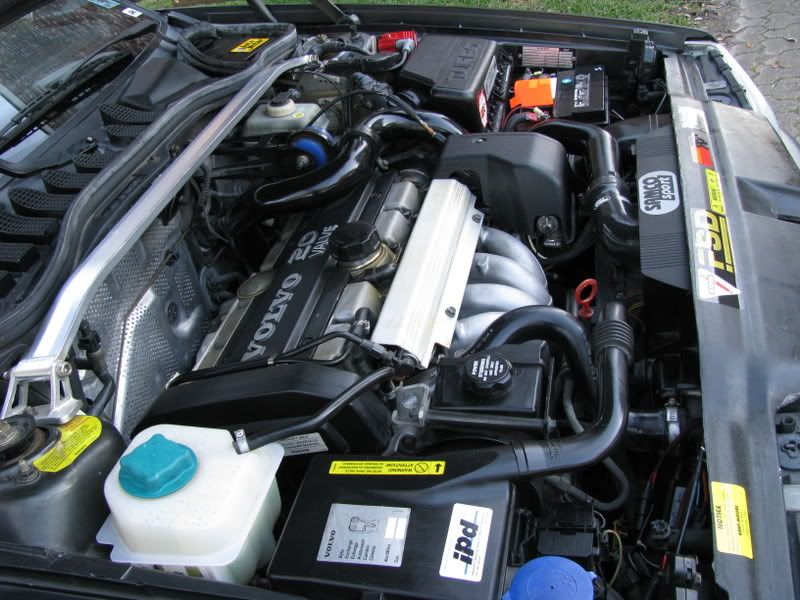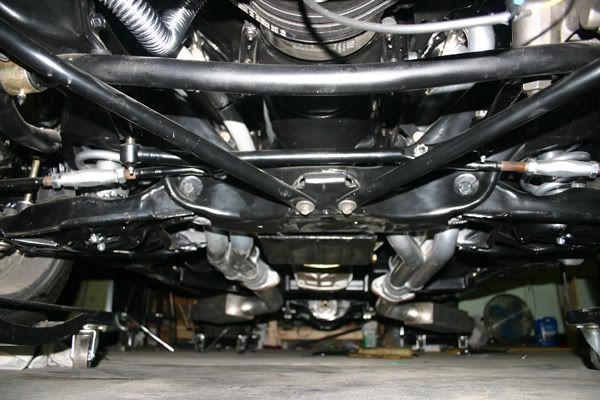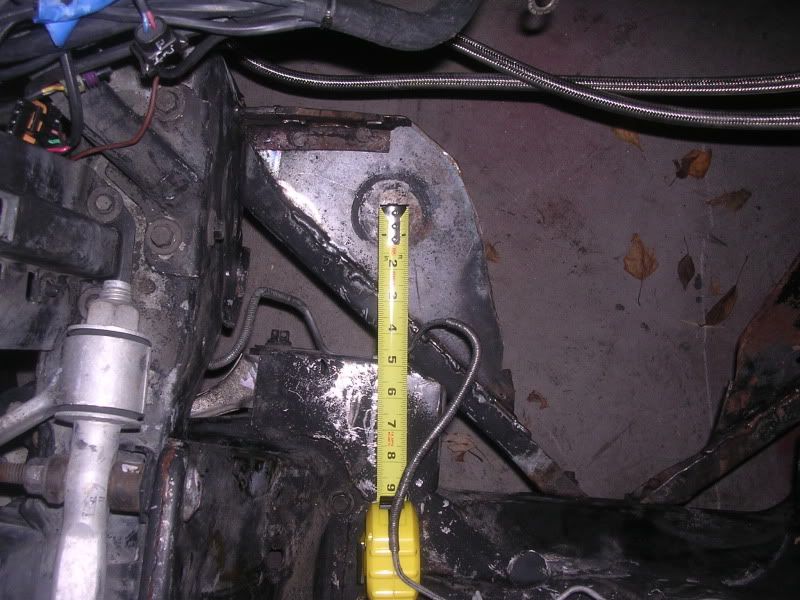
So I'm about to doa round of 100k mile maintenanc eon my mustang (Shocks, struts, plugs, etc) and I've been looking for some other additional project to spiffy it up without adding to my growing debt on the project.
Which brings me to DIY chassis braces, specifically a strut tower brace. I've read varying thoughts on the effectiveness of the strut tower braces on the S197 platform, and I've never made the leap of spending $200+ on something that might or might not have any real benefit. Plus, I've never seen one I really like - specifically one that triangulates to the firewall.
But, I realized that I have a welder and need a good fab project. I have yet to weld up anything for actual use on the car, and this seems like a good way to go.
So, for all you chassis builders, talk to me about steel choice - square tube ok? size? wall thickness? plate thickness for the ends? Does triangulating to a firewall mount gain anything, or should I just do a 2 tube span of the engine and call it good?
I've got Explicit Speed Performance bars on my CRX and they are square tube and plenty stiff. Triangulated to the firewall up front. They're pretty much a Honda-only shop but you could look there for design ideas.

*not my car, but same bar.
I've got one from OBX was cheap on fleabay. It's a piece of flat extruded aluminum bent to fit my engine bay. What I don't like about it: it's hinged at both strut towers, it adds rigidity, but I feel it should only be hinged on one side, or possibly none (none might be too much for a DD, I don't know), also each mounting point only captures two of the three strut mount bolts, I would like it to use all three. For roughly $50 shipped though it serves it's purpose I guess.
Here's a pic of the same brace I have on a google image car:

I found the much more noticeable upgrade was the Konis & Eibachs than the strut tower brace. What do I know, but there's my $0.02.
Triangulating to the firewall is good, those that just connect the two strut towers still allow both towers to move independently of the rest of the frame. That said the benefit of these things (strut tower braces on modern-ish cars specifically) is somewhere between "slight" and "only helps in theory."
It's a good thing to install if you can do it for cheap or you know you've got real chassis flex problems, otherwise there are many better ways to spend your money.

ransom
SuperDork
8/18/12 8:16 p.m.
I would think .065" wall 1" square would be dandy for the tubes, and I'd think .125" for the plates themselves. Hopefully the engine bay will allow you to make straight shots across without bends.
I'd think triangulating to the cowl would be good, depending on whether there's a nice solid spot there to tie to.
But my fabrication experience is limited and I don't know this application, so take it with a grain of salt.
My BMW 2002 is something of a flexi flyer, but the untriangulated strut tower brace I made which was only tied by an incredibly light military surplus helicopter control rod (with heim joints on the ends, mounted in single shear; Ewww, yuck) still seemed to make a noticeable difference, and that was doing pretty much everything wrong.
As an aside, I wasn't sure what to make of hinged designs 'til reading Carroll Smith's Engineer To Win and noted how much pivots on the ends detract from the buckling resistance of a tube in compression. Of course, being solidly mounted to a flimsy thing doesn't help much more than being mounted to a hinge...
GameboyRMH wrote:
Triangulating to the firewall is good, those that just connect the two strut towers still allow both towers to move independently of the rest of the frame. That said the benefit of these things (strut tower braces on modern-ish cars specifically) is somewhere between "slight" and "only helps in theory."
It's a good thing to install if you can do it for cheap or you know you've got real chassis flex problems, otherwise there are many better ways to spend your money.
so the engineers at GM didn't know what they were doing when they added a strut tower brace on the ZL1 Camaro?

I don't think they had a choice in that case...

noddaz
Reader
8/18/12 8:32 p.m.
nope...
But since this thread is rolling along, will any kind of steel do?
I ask because I have a few old bicycles laying around...
And another thing. Are braces hinged to allow some give? Or are they hinged to allow easy removal to service the engine?

ransom
SuperDork
8/18/12 10:15 p.m.
In reply to noddaz:
Well, the bicycles will either be mild steel or CrMo. The latter's a bit trickier to weld, but since if one of your welds cracks the front end will just be less stiff, maybe that's not a bit deal... They'll also probably be quite thin, but that might be just fine.
In any case, plain old mild steel, either ERW (electric resistance welded, the stuff with a seam) or DOM (drawn over mandrel) would be fine. Dimensions aside, the quality of the bike tubing should be dandy.
I don't know about the hinges. I suspect for service, but I also suspect they detract a certain amount from the total rigidity. I suppose in some applications attempts to weld everything solid may result in cracking if you can't actually stop the motion close enough to completely.
Bike tubes? They are thin. Very thin. But if you want to try? Go to the junkyard and find the heaviest '70s frame you can find. Look for steel wheels, and the lowest grade of everything. Basically looking for the old "gas pipe special". Thick wall tubing....for a bicycle.
Steel framed bikes that are not using "over sized" tubing, generally use steel about 1-0.9mm thick. If it is butted steel, it will be about the same at the end, and around 0.7-0.6 in the middle of the tube. About 20/21 gauge to 24/26 gauge in the middle.

Keith
MegaDork
8/18/12 11:58 p.m.
When doing your design, remember that they're supposed to be strong in tension and compression. If your cross bar has big bends in it, it won't be as strong as one with a straight bar.
Check out these two. The front one has a big ol' bend in the aluminum bar. You can flex this thing like a ski. It's also mounted with a pivot. It looks cool in an engine bay, but can't do much more. The rear one has an almost straight bar and no pivoting. It's also got stronger "towers" on it. Guess which one is more effective? The good news is that it's probably easier to make a good one at home than a crap one.

As for the triangulation, I'm less convinced about the value there. The big hole for the engine prevents any real strength laterally, but there's lots of fore-aft support for when you're braking. If you can tie in to a solid part of firewall, sure, but a lot of the ones I've seen have been anchored to almost nothing.
Cars with double-wishbone suspensions don't need this sort of brace as much as a strut type, as they don't feed cornering loads into the top of the shock. But even then, you can feel the difference if you install a good one.

SkinnyG
HalfDork
8/19/12 12:36 a.m.
I fab'd a 3/4" 16ga square tube mount for the top of my old B13 Sentra. Very solid. Marginal improvement.
I fab'd a 3/4" 16ga square tube for the front control arms - fantastic improvement, as in: needing to re-learn the car. Look for what might flex, and see what you can do to stop it from flexing.
My experience for rear drive cars is to connect the frame rails as far forward as possible instead of a strut brace. On my TR8, I welded a connector behind the bumper and installed a removable bar between the engine and radiator. Solid mounted the subframe as well by replacing the rubber bushings with aluminum. Now it shoots where I am it, no matter how stiff the spring rates. I suppose the ultimate would be to run connectors from the firewall over the towers and down to the rails like on SCCA production cars.

tr8todd wrote:
My experience for rear drive cars is to connect the frame rails as far forward as possible instead of a strut brace. On my TR8, I welded a connector behind the bumper and installed a removable bar between the engine and radiator. Solid mounted the subframe as well by replacing the rubber bushings with aluminum. Now it shoots where I am it, no matter how stiff the spring rates. I suppose the ultimate would be to run connectors from the firewall over the towers and down to the rails like on SCCA production cars.
in the 80's, GM was putting a brace in the Z/28s and Trans Ams that got the upgraded suspension that bolted into the sway bar mounting bolts on each crame rail and tied the 2 sides together- it's called the "wonder bar" these days and it was supposed to make a noticable difference in how the car handled. i'm gonna make one for my Camaro some day..
GM also put some nifty braces on the frames of some G bodies in the 80's that ran from each front frame horn behind the bumper mounts down to the center of the engine crossmember. i can say from personal experience that those 2 bars do a great job of tightening the front end up after putting them on my Regal- not only is the steering more responsive, bit it also got rid of an annoying squeek in my dash.. some G body Grand Prixs also got a bar similar to the F body "wonder bar" that tied the two frame horns together in front of the steering box and idler arm which is said to add even more stiffness than just the triangulated bars i already added. i'm gonna make one of those for my Regal some day..

SVreX
MegaDork
8/19/12 9:10 p.m.
I built mine for free out of a discarded downrod from a ceiling fan... 
I am not convinced the triangulated ones add that much. When cornering, the stress is almost entirely on one side of the car. Tying the tower under stress to the opposite side (which is not under stress) adds quite a bit.
But the square tubing is definitely quite nice.

novaderrik wrote:
tr8todd wrote:
My experience for rear drive cars is to connect the frame rails as far forward as possible instead of a strut brace. On my TR8, I welded a connector behind the bumper and installed a removable bar between the engine and radiator. Solid mounted the subframe as well by replacing the rubber bushings with aluminum. Now it shoots where I am it, no matter how stiff the spring rates. I suppose the ultimate would be to run connectors from the firewall over the towers and down to the rails like on SCCA production cars.
in the 80's, GM was putting a brace in the Z/28s and Trans Ams that got the upgraded suspension that bolted into the sway bar mounting bolts on each crame rail and tied the 2 sides together- it's called the "wonder bar" these days and it was supposed to make a noticable difference in how the car handled. i'm gonna make one for my Camaro some day..
GM also put some nifty braces on the frames of some G bodies in the 80's that ran from each front frame horn behind the bumper mounts down to the center of the engine crossmember. i can say from personal experience that those 2 bars do a great job of tightening the front end up after putting them on my Regal- not only is the steering more responsive, bit it also got rid of an annoying squeek in my dash.. some G body Grand Prixs also got a bar similar to the F body "wonder bar" that tied the two frame horns together in front of the steering box and idler arm which is said to add even more stiffness than just the triangulated bars i already added. i'm gonna make one of those for my Regal some day..
here is a guy with an fbod that has one.. not easy to see though all the red crap...
http://www.cardomain.com/ride/657810/1987-pontiac-firebird/page-8
I'd wondered about something like that on the s10... with the idler arm being out there it would make since to brace up there... may have to use some of my spare bed frame rail to build a brace like that when I move onto dealing with suspension
for the G body i'm guessing this is what you're talking about

and a better pic

donalson wrote:
novaderrik wrote:
tr8todd wrote:
in the 80's, GM was putting a brace in the everything.....
and a better pic

The C4 corvettes got something similar later in the run. Here is a poor picture of mine:

and here is a google picture from above (empty engine bay):

Personally I want to make some chassis braces from thin walled aluminum wrapped in carbon fiber. Some day. 
On materials, there's absolutely no reason to use exotic alloys on a strut tower bar. They need rigidity (which is pretty much the same for any given alloy of a particular metal) not yield strength.


































